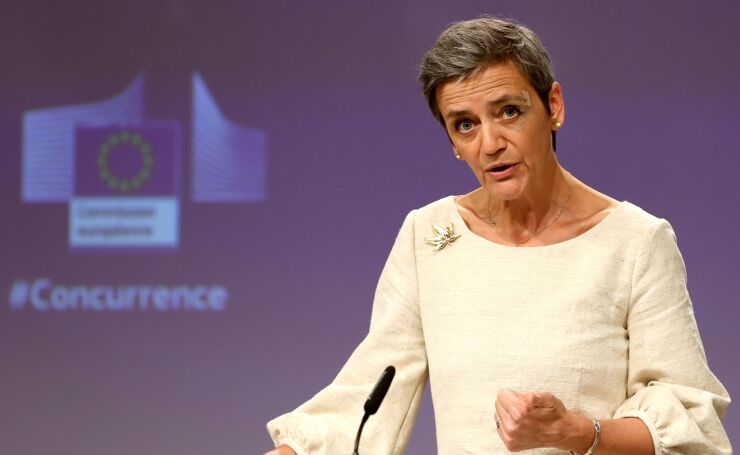Apple acts as a gatekeeper to the technology that supports its mobile wallet and App Store, a position that rankles regulators, competitors and developers almost everywhere the company does business.
The most recent pushback came on Monday, when the
The commission, which covers the European Union's 27 nations, is just
Notably, Apple has not let other companies access the NFC chip to enable contactless payments from their own mobile wallets. While Google's policies are often in line with Apple's, Google does allow third-party wallets such as Samsung Pay to operate on Android handsets.

"We preliminarily found that Apple may have restricted competition, to the benefit of its own solution Apple Pay. If confirmed, such conduct would be illegal under our competition rules,” said Margrethe Vestagar, executive vice president in charge of the Commission's competition policy, in a statement on the Commission's site.
The Commission is focused on what it says is Apple's decision to prevent mobile wallet app developers from accessing the necessary hardware and software on its devices to the benefit of Apple Pay and detriment of potential rival mobile wallets on Apple devices. By reserving iOS access to NFC on Apple Pay, there's an "exclusionary effect on competition, less innovation and less choice" on iPhones, said the Commission, adding that could be a violation of an EU treaty that prohibits the abuse of a dominant market position.
The commission did not mention potential fines in its Monday statement, but under the
Consumers don't typically switch mobile operating systems, according to research the commission released
“Mobile payments play a rapidly growing role in our digital economy. It is important for the integration of European Payments markets that consumers benefit from a competitive and innovative payments landscape," Vestager said in the commission's statement.
There have been other political battles over accessing NFC technology via iOS devices. For example,
Beyond the EU's NFC probe, Apple faces pressure over its payment practices in several jurisdictions, including other commission probes. The commission is also investigating Apple's requirement that streaming apps direct payors to Apple's internal payment system while limiting what third-party developers can say about other payment options.
The dispute over routing developers to Apple's internal payment system over alternative payment rails is similar to a legal battle between
The stakes for Apple are high, given it charges a transaction fee of 15% to 30% for payments processed in Apple's ecosystem. Any ruling that finds Apple to be a monopoly threatens those fees. Apple recently
The European Commission did not return a request for comment by deadline. "Apple Pay is only one of many options available to European consumers for making payments, and has ensured equal access to NFC while setting industry-leading standards for privacy and security," an Apple spokesperson said in an emailed statement. "We will continue to engage with the Commission to ensure European consumers have access to the payment option of their choice in a safe and secure environment.”





